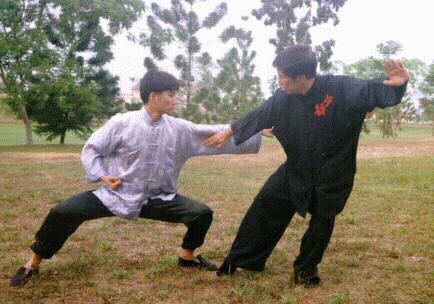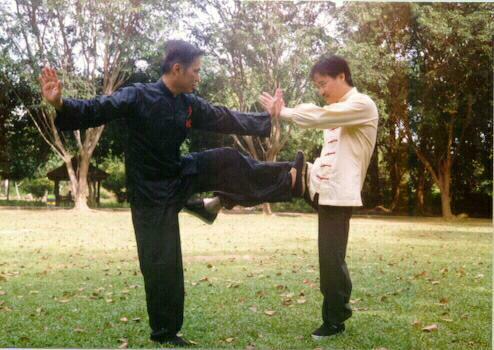

The term 'Taijiquan' is a short form of 'Taiji quanfa'. 'Taiji' is the Chinese word meaning 'the grand ultimate' or the cosmos. And 'quanfa' means 'fist techniques' or martial art. Taijiquan, therefore, means 'Cosmos Kungfu'. Indeed every movement in Taijiquan is made according to martial considerations, i.e. a Taijiquan practitioner moves the way he moves in a Taijiquan performance because that particular way gives him the best technical advantage in a given combat situation. Hence if you say that you practise Taijiquan for health and not for fighting, you probably do not realize that Taijiquan actually means Cosmos martial art, and that virtually all great Taijiquan masters in the past practised it for fighting.
Find out from Basic Self-Defence of Taijiquan why you should still practice Taijiquan as a martial art even if your main objective is health.
But if you prefer a more gentle approach to developing power and stamina, as well as calmness and mental freshness (which are not readily found in martial arts that emphasize aggressiveness and brutality), practising Taijiquan as a martial art is an excellent choice. Hits are sometimes sustained in Taijiquan sparring too, but unlike in many other martail arts where such hits are routinely left untreated, such accidental injury which is far less often in Taijiquan than in most other arts, is relieved by the internal energy flow which forms an integral part of Taijiquan training.
How can a student tell whether he is practising Taijiquan as a dance or as a martial art? It is actually quite easy, although it is amazing how very few students have given a thought to it. If much of the training time is given to performing beautiful external forms, with little or no training to develop internal force and combat efficiency, it is likely to be a Taiji dance. If after learning the external forms, the onus of the training is to develop internal force and combat efficiency, Taijiquan is practised as a martial art, which was also the way all great Taijiquan masters practised it in the past.
Some Taijiquan exponents, especially those of the Chen style, regonize Chen Wang Ting instead of Zhang San Feng as the First Patriarch of Taijiquan. Chen Wang Ting was a great scholar-general at the end of the Ming Dynasty. If you examine his poems you can find much evidence that his main concern, like that of Zhang San Feng a few centuries before him, was spiritual development rather than martial efficiency. The following lines from his poem are illustrative:
Practising Taijiquan is helpful if you are interested in spiritual cultivation. If you can attain the advanced level of Taijiquan training whereby your form, energy flow and mind have beome one, you may have direct experiences that you are actually more than your physical body, thus giving you experiential result of spiritual cultivation which many people merely read about in books.
You can return to the other format of this website from HERE
TAIJIQUAN (TAI CHI CHUAN) HOME PAGE
As the aim of this website is to disseminate knowledge, if you like to reproduce any information given here, or to link this website to yours, please feel free to do so. It will be appreciated if you can please mention the source of the information.
Taijiquan for Health
This of course does not mean that you cannot practise Taijiquan for health. Indeed most people who practise Taijiquan all over the world today do so for health reasons, and Taijiquan is excellent for promoting health. But you should remember the following two points if you want more benefits from your Taijiquan training. One, Taijiquan is basically a martial art, and two, even if your main intention of practising Taijiquan is for health and not for combat, you should practise it as a martial art.

Practising Taijiquan as a Martial Art
A martial artist has to be fit and healthy. otherwise he will be unable to fight well, or the martial art he practises is not wholesome. Different martial arts have different ways of training. In some arts, the practitioners have to strike sandbags, lift weights and often sustain hits in sparring. If you want powerful strikes, strong muscles and do not mind some injury sustained in sparring (which is often unattended to), you may choose such martial arts.
Taijiquan for Spiritual Cultivation
Yet, more than an excellent martial art, Taijiquan is a programme for spiritual cultivation, irrespective of race, culture and religion. Of course, not many people are ready for, or interested in, spiritual cultivation; that is the reason why this spiritual aspect of Taijiquan is seldom discussed and little known. Actually, spiritual cultivation was the original aim of Taijiquan when it was first evolved from Shaolin Kungfu by Zhang San Feng. The concern of this great Taoist master far surpassed petty fighting; he developed Taijiquan to further his spiritual quest to merge with the great void.
Now I only have the 'Classic of Yellow Palace'
to accompany me.
In times of leisure I invent martial art,
In times of activity I farm the fields,
And teach children and grandchildren
to be strong and healthy
to meet life's expediencies.
Links to other Websites of Sifu Wong
SHAOLIN KUNGFU, CHI KUNG AND ZEN
please state your name and country
as well as mention this webpage as reference
to readers' questions at
TO HOME PAGE
times since February 1998
Wong Kiew Kit
Grandmaster
Shaolin Wahnam Chi Kung and Kungfu
81 Taman Intan B/5, 08000 Sungai Petani
Kedah, Malaysia
Phone 60-4-422 2353; FaX 60-4-422 7812
E-mail shaolin@pd.jaring.my
TO TOP OF PAGE